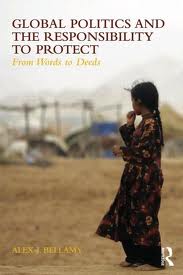
Book review: “Global Politics and the Responsibility to Protect. From words to deeds.” by Alex J. Bellamy
Has the Responsibiliy to Protect (R2P), a concept invented in 2001, made the world a safer place? Skeptics point to the largest crises in terms of the numbers of civilians intentionally killed since 2005: Iraq (75,000), Somalia (17,000), Sudan (5,000), Democratic Republic of the Congo (5,000) and Afghanistan (5,000). Strikingly, R2P has not played a role in any of them. And regarding R2P’s big success story, its usage to end post-election violence in Kenya that led to 1,500 deaths, the concept’s impact on events is disputed.
Yet while progress has indeed been slow, one cannot deny that the way the international community thinks and acts upon mass atrocities has changed profoundly over the past decades. In 1979, for example, the UN Security Counil harshly criticized Vietnam for invading Cambodia, even though Vietnam’s intervention put an end to a genocide that killed about 1.5 million people, and which would have killed many more had Vietnam not stopped the slaughter. Such global restraint in the face of mass killings is much less likely today (even though it is not entirely unimaginable).
In a Global Politics and the Responsibility to Protect, Alex Bellamy, a leading thinker on R2P, provides a broad analysis of the concept’s history and relevance, arguing that “R2P’s ultimate test is not the number of resolutions that endorse it, but the number of graveyards that stand empty because tragedy was averted.”
Looking into the future, Bellamy argues that “implementing R2P requires nothing less than the reconfiguring of state identities and national interests so that the prevention of atrocities becomes habitual.” Against this, one could argue that prevention has, in different forms, already become part of common practice. UN peace missions are employed all over the world, and regional organizations are building an increasingly powerful web of rules and norms aimed at protecting civilians. Of course, prevented atrocities do not make headlines, so R2P is likely to be remembered for its mistakes rather than his success stories. Rwanda will be known for the 800,000 people killed, yet we will never know how many lives MONUC and MONUSCO saved in the Democratic Republic of the Congo.
The book is comprehensive and full of details that help dispel common myths about R2P. For example, Bellamy shows that at the UN World Summit in 2005, Western governments did not impose their will on reluctant emerging countries. Rather, a real negotiation took place, and the resulting compromise everyone could agree on differs starkly from what the International Commission on Intervention and State Sovereignty (ICISS) recommended in December of 2001. Most notably, the ‘responsibility to rebuild’ did not survive the summit. Also, the proposal that the General Assembly could authorize an intervention if the Security Council failed to act is no longer part of R2P. This further weakens those who argue that R2P is a Western concept. Similarly, the author points out that the ICISS report generated more visibility than the UN Summit, which is why many observers are unaware of the modifications made in 2005. Bellamy also makes a forceful claim against the argument that R2P may actually create the moral hazard for rebel groups to purposefully induce genocidal violence, calculating that this will lead to an outside intervention.
Notably, the author also explores important questions other analysts overlook: What is the connection between economic development, democratization and R2P? How important is early warning, and which role do regional organizations play? These are crucial questions, particularly because emerging powers have recently emphasized that the focus of R2P must lie on prevention. The question of whether R2P should include development is crucial from a tactical point of view. While poverty and the risk for large-scale killings are certainly connected, including development into the R2P agenda could subordinate the concept to the decade-old disagreements that could derail its momentum. It is particularly here that Bellamy could have written more about emerging powers’ views, which are likely to play a more important role vis-à-vis R2P in the years to come.
Bellamy’s book does not focus on R2P’s philosophical underpinnings. Rather, he focuses on the challenges of operationalization of the principle – “from words to deeds”, as the book’s subtitle suggests. Given its density, Global Politics and the Responsibility to Protect is unlikely to find a wide readership outside of a relatively small academic circle. Still, it is one of the most complete analyses of the history and current debate about R2P, and indispensable for those who seek to gain a profound understanding of one of the most exciting topics in contemporary international affairs.
Read also:
West Africa’s contribution to R2P








